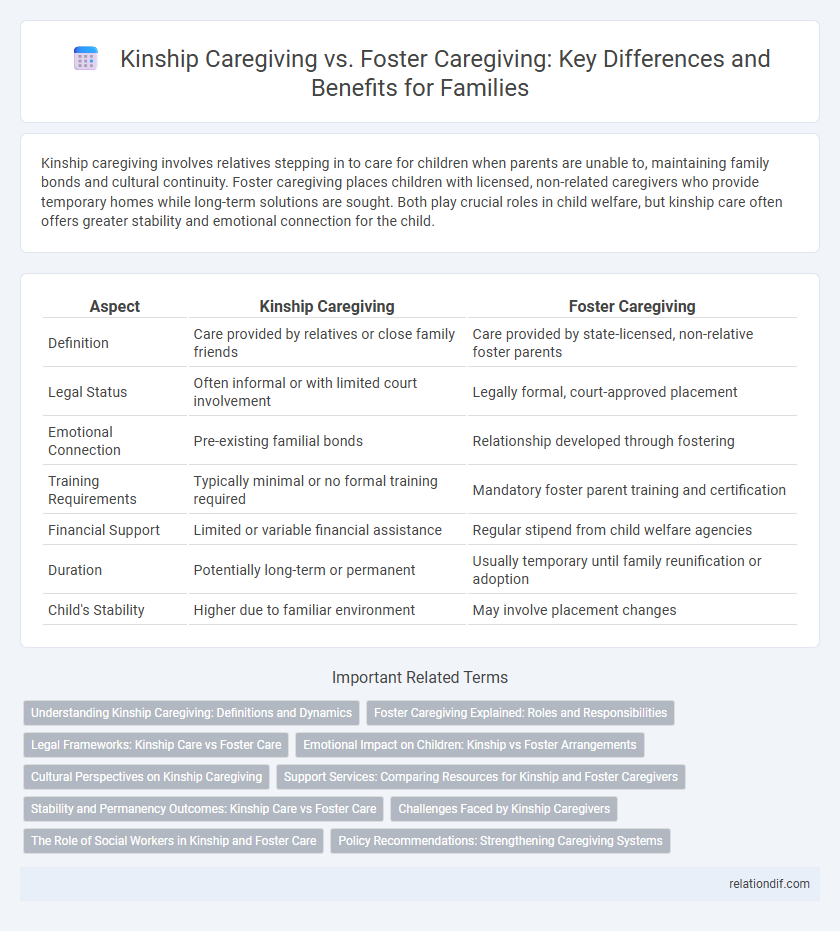Kinship caregiving involves relatives stepping in to care for children when parents are unable to, maintaining family bonds and cultural continuity. Foster caregiving places children with licensed, non-related caregivers who provide temporary homes while long-term solutions are sought. Both play crucial roles in child welfare, but kinship care often offers greater stability and emotional connection for the child.
Table of Comparison
| Aspect | Kinship Caregiving | Foster Caregiving |
|---|---|---|
| Definition | Care provided by relatives or close family friends | Care provided by state-licensed, non-relative foster parents |
| Legal Status | Often informal or with limited court involvement | Legally formal, court-approved placement |
| Emotional Connection | Pre-existing familial bonds | Relationship developed through fostering |
| Training Requirements | Typically minimal or no formal training required | Mandatory foster parent training and certification |
| Financial Support | Limited or variable financial assistance | Regular stipend from child welfare agencies |
| Duration | Potentially long-term or permanent | Usually temporary until family reunification or adoption |
| Child's Stability | Higher due to familiar environment | May involve placement changes |
Understanding Kinship Caregiving: Definitions and Dynamics
Kinship caregiving involves relatives or close family friends providing care for children when their biological parents are unable to do so, emphasizing the importance of maintaining family bonds and cultural identity. This form of caregiving often includes grandparents, aunts, uncles, or older siblings, who assume parental responsibilities with a focus on stability and emotional connection. Compared to foster caregiving, kinship care typically results in better outcomes for children, such as increased placement stability and stronger ties to their community.
Foster Caregiving Explained: Roles and Responsibilities
Foster caregiving involves providing temporary care for children placed by the state due to safety or neglect concerns, emphasizing legal compliance and collaboration with social services. Foster parents are responsible for meeting the child's physical, emotional, and educational needs while supporting reunification efforts with biological families when possible. This role requires training, background checks, and ongoing communication with caseworkers to ensure the child's well-being and adherence to foster care regulations.
Legal Frameworks: Kinship Care vs Foster Care
Kinship caregiving operates under a legal framework that often emphasizes preserving family connections and may involve informal or formal guardianship arrangements, whereas foster caregiving is governed by state-regulated licensing and oversight to ensure child welfare standards. Kinship caregivers frequently face fewer licensing requirements but limited access to financial support and services compared to foster caregivers, who receive training, stipends, and regular assessments. Legal distinctions influence custody rights, permanency planning, and the child's stability within each caregiving model, shaping the overall caregiving experience and outcomes.
Emotional Impact on Children: Kinship vs Foster Arrangements
Kinship caregiving often provides children with greater emotional stability due to familiar family connections, which fosters a sense of belonging and continuity. Foster caregiving can introduce challenges related to attachment and identity as children adjust to new environments and caregivers. Studies indicate children in kinship care exhibit fewer behavioral problems and higher emotional well-being compared to those in traditional foster care settings.
Cultural Perspectives on Kinship Caregiving
Kinship caregiving preserves cultural identity by maintaining children within their extended family and community, reinforcing traditions and shared values. It promotes emotional stability through familiar relationships, fostering a stronger sense of belonging compared to non-relatives in foster caregiving. Indigenous and minority communities often prioritize kinship care to uphold cultural continuity and resilience amid social challenges.
Support Services: Comparing Resources for Kinship and Foster Caregivers
Kinship caregivers often access support services tailored to preserving family connections, such as financial assistance, counseling, and legal aid through programs like the Kinship Navigator. Foster caregivers receive comprehensive resources including specialized training, respite care, and therapeutic services coordinated by child welfare agencies to address diverse child needs. Both caregiving types benefit from community-based support groups, but foster care typically offers more structured guidance and state-funded support mechanisms.
Stability and Permanency Outcomes: Kinship Care vs Foster Care
Kinship caregiving often provides greater stability and permanency outcomes compared to foster care, as children are placed with familiar family members, promoting emotional security and continuity. Research indicates that kinship care placements result in fewer disruptions, lower rates of re-entry into the child welfare system, and longer-lasting placements than traditional foster care. Stability in kinship care supports better behavioral, academic, and mental health outcomes for children, emphasizing its effectiveness in achieving permanency.
Challenges Faced by Kinship Caregivers
Kinship caregivers often face significant challenges such as limited financial support and lack of access to formal services compared to foster caregivers, which can impact the quality of care provided. Emotional stress and legal complexities frequently burden kinship caregivers, who may not have formal training or resources that foster parents typically receive. Limited recognition and inadequate support systems exacerbate difficulties in managing behavioral issues and meeting children's educational needs within kinship care settings.
The Role of Social Workers in Kinship and Foster Care
Social workers play a critical role in both kinship and foster caregiving by providing assessment, support, and resources tailored to each family's unique needs. They facilitate connections between children and their caregivers, ensuring stability and wellbeing while navigating legal and social services. Their expertise in managing the complexities of kinship and foster care environments promotes successful outcomes and permanency for vulnerable children.
Policy Recommendations: Strengthening Caregiving Systems
Policies aimed at strengthening caregiving systems should prioritize increased funding and support services tailored specifically for kinship caregivers, who often face unique legal and financial challenges compared to foster caregivers. Implementing streamlined licensing processes and offering dedicated training and respite resources can enhance the stability and quality of care within kinship arrangements. Emphasizing collaboration between child welfare agencies and community organizations fosters comprehensive support networks that address both kinship and foster caregiving needs effectively.
Kinship caregiving vs Foster caregiving Infographic

 relationdif.com
relationdif.com